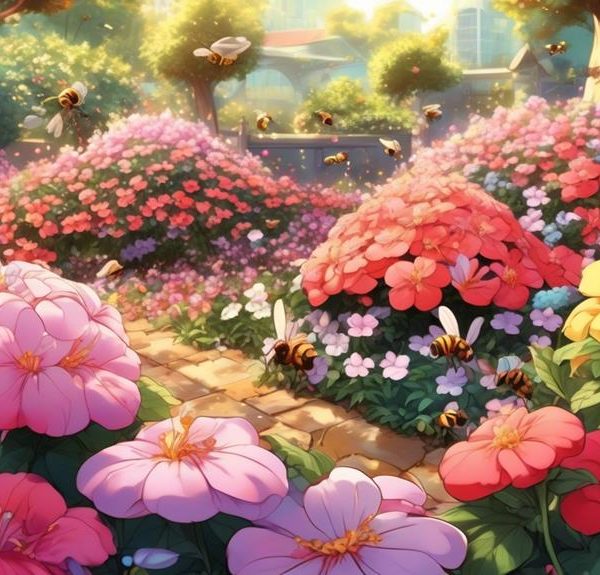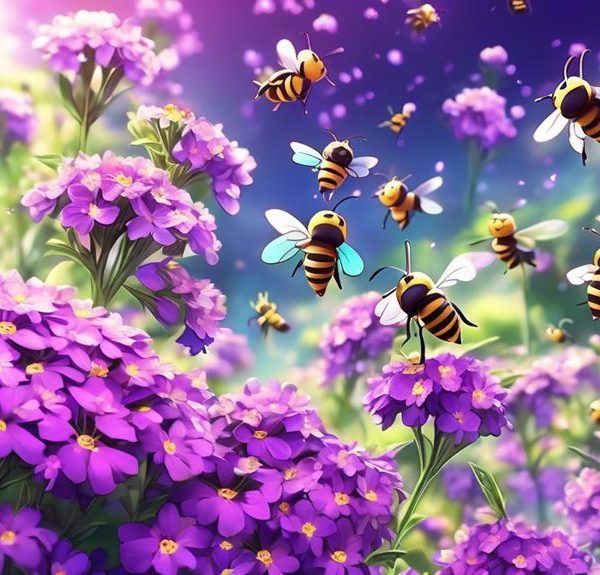Find out why bees are surprisingly attracted to the calming scent of lemon balm in your backyard ecosystem.
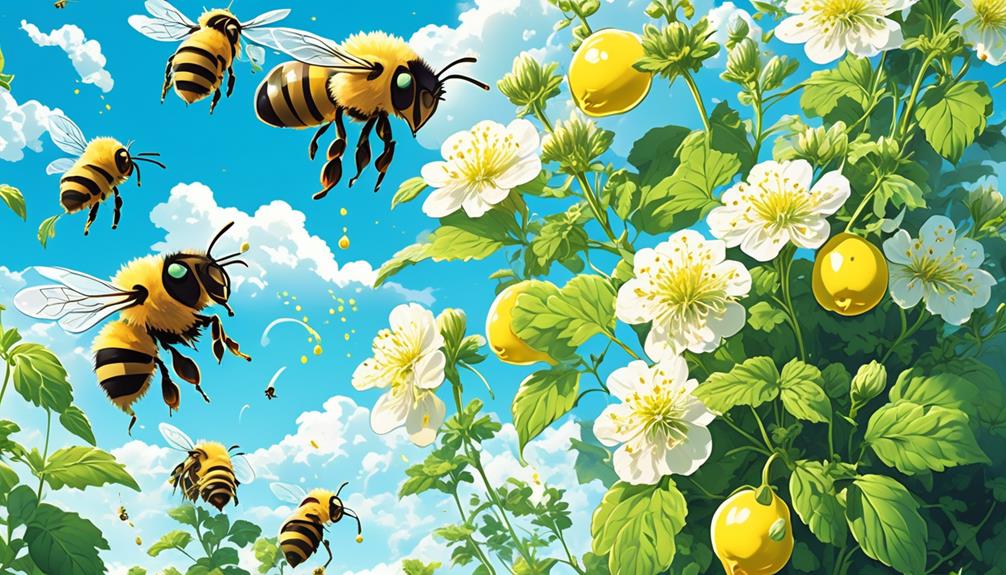
Do Bees Like Lemon Balm?
In the world of nature, it's often surprising to see the attraction of bees to the delicate scent of lemon balm, an herb generally known for its calming properties on the human nervous system.
You've probably wondered why such an unlikely relationship exists. Well, it's a curious intersection of insect and plant behaviors that might give you a new perspective on your garden or even your next cup of herbal tea.
It's a fascinating story that's not as simple as it seems, and the details might just alter how you view your backyard ecosystem.
Key Takeaways
- Bees are highly attracted to lemon balm due to its strong citrusy aroma and abundant nectar production.
- Lemon balm's flowers are shaped in a way that makes it easy for bees to collect pollen, further enticing them.
- Planting lemon balm in gardens can attract bees for pollination and enhance biodiversity.
- Beekeepers can strategically place hives near lemon balm to promote higher honey production.
Understanding Bee Preferences
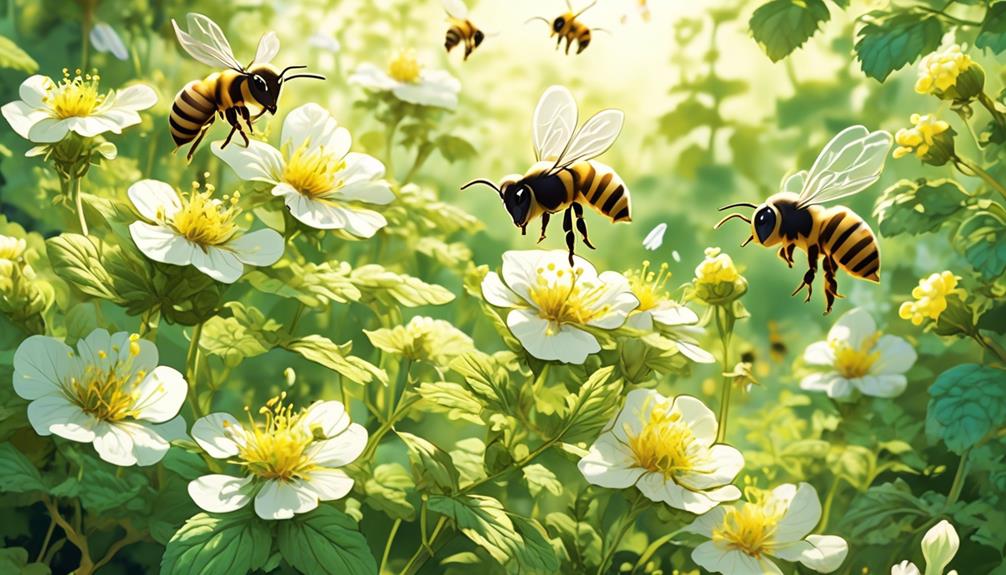
Delving into the preferences of bees, it's crucial to understand that these industrious insects have a distinct penchant for certain plants and scents, with lemon balm being a notable favorite. You might wonder, why lemon balm? It's simple. The strong, citrusy aroma of lemon balm, along with its rich nectar, act as a magnet for bees.
But it's not just about the scent. The structure of the lemon balm flower itself plays a vital role. They're shaped in a way that's easy for bees to get in and out, facilitating efficient pollen collection. This, in turn, aids in the propagation of the plant, making it a symbiotic relationship.
You ought to know, bees don't limit themselves to lemon balm. They're also drawn to other plants like lavender, coneflowers, and sunflowers. These plants, like lemon balm, have a strong scent and are rich in nectar.
Understanding bee preferences isn't just fascinating, it's also key to supporting their survival. By planting their favorites in your garden, you're not only creating a haven for them, but also contributing to the important work they do in pollinating our world.
Lemon Balm: A Brief Overview
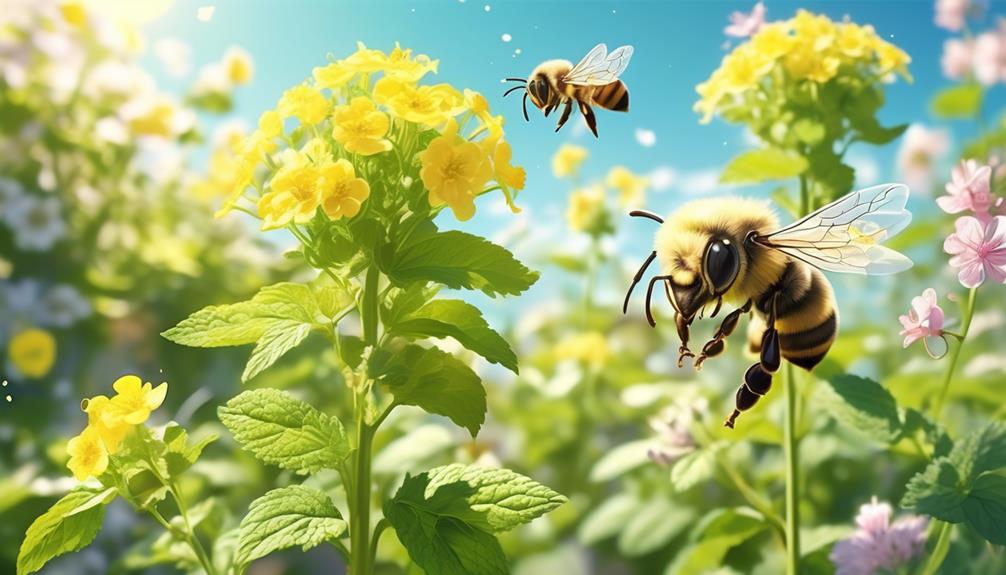
Now that you're familiar with bees' fondness for lemon balm, let's take a closer look at this plant that captivates our buzzing friends so much.
Scientifically known as Melissa officinalis, lemon balm is a perennial herb from the mint family. It's native to south-central Europe, the Mediterranean Basin, Iran, and Central Asia, but now grows worldwide.
Lemon balm's charm lies not only in its honeybee allure but also its rich history and numerous uses. Historically, it's been used in traditional medicine for various ailments, from insomnia to anxiety. It's also a popular culinary herb, lending a fresh, lemony flavor to dishes and drinks. You'll often find it in teas, salads, and fish dishes.
Recognizing lemon balm is easy. It boasts heart-shaped leaves that exude a strong lemon scent when crushed, hence its name. During summer, you'll see it bloom with small white flowers, which bees find irresistible. It's a hardy plant, thriving in well-drained soil and full sun to partial shade.
The Relationship Between Bees and Herbs
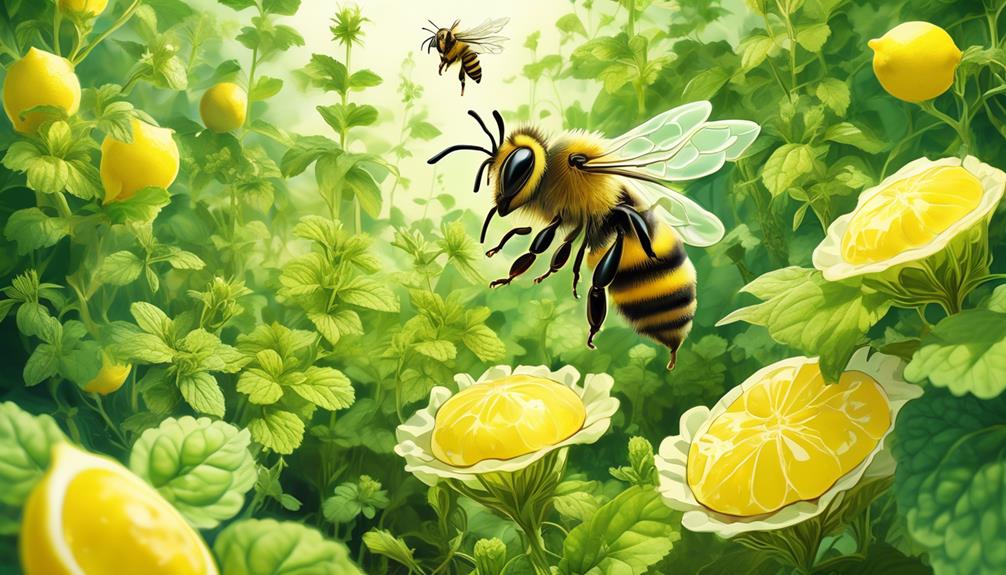
Understanding the symbiotic relationship between bees and herbs is crucial for any gardener looking to create a pollinator-friendly patch. Bees, especially honeybees, play an essential role in pollination, contributing significantly to the survival and growth of herbs. They're attracted to vibrant colors and sweet nectar, which herbs like lemon balm abundantly offer.
In return, bees carry pollen from one plant to another, facilitating cross-pollination. This process is vital for the production of seeds in many plants, ensuring their propagation. Therefore, cultivating herbs that bees favor can enhance your garden's vitality and biodiversity, as well as support local bee populations.
Here's a snapshot of how certain herbs are particularly attractive to bees:
Herb | Reason for Attraction |
|---|---|
Lemon Balm | Produces large amounts of nectar |
Lavender | Vibrant colors and rich nectar |
Mint | Strong scent and plentiful nectar |
Sage | Bright colors and high nectar production |
Thyme | Dense flower clusters and sweet nectar |
Bees' Interaction With Lemon Balm
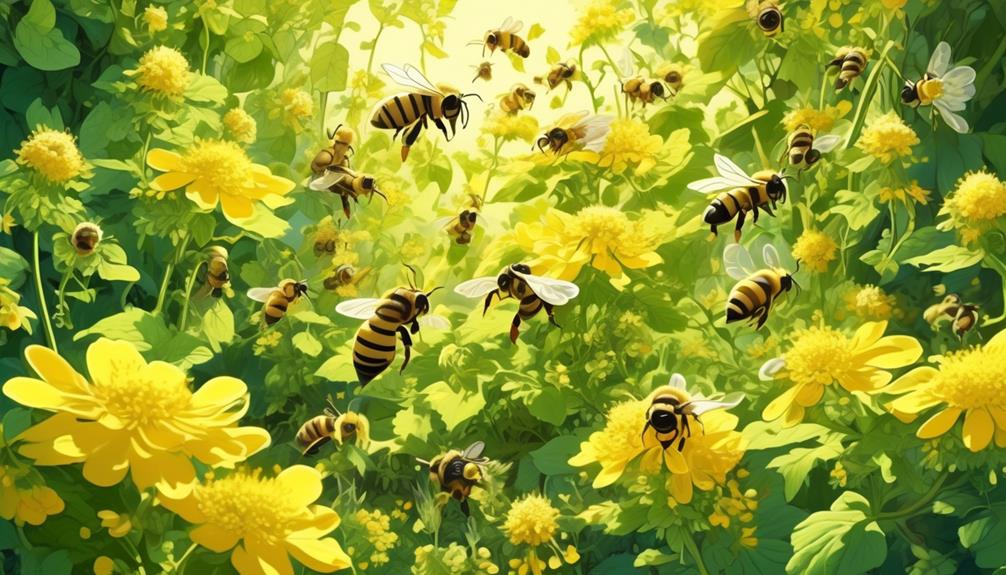
When it comes to lemon balm, bees are remarkably attracted to this herb due to its potent aroma and the copious amounts of nectar it produces. You'll often see them buzzing around lemon balm plants, eagerly foraging for the nectar within its small, white flowers.
This interaction isn't accidental. Lemon balm, scientifically known as Melissa officinalis, has evolved to entice bees. Its aroma, similar to that of lemons, is almost irresistible to these little pollinators. Furthermore, the plant's structure is conducive for bees; its clustered flowers offer abundant nectar and pollen, vital food sources for bees.
As a bee approaches a lemon balm plant, it's drawn in by the scent. Once it lands on the clusters of flowers, it begins its work. As it moves from flower to flower, it inadvertently transfers pollen, aiding in the plant's reproduction process. This mutually beneficial relationship is a perfect example of symbiosis in nature.
Impact on Gardening and Beekeeping
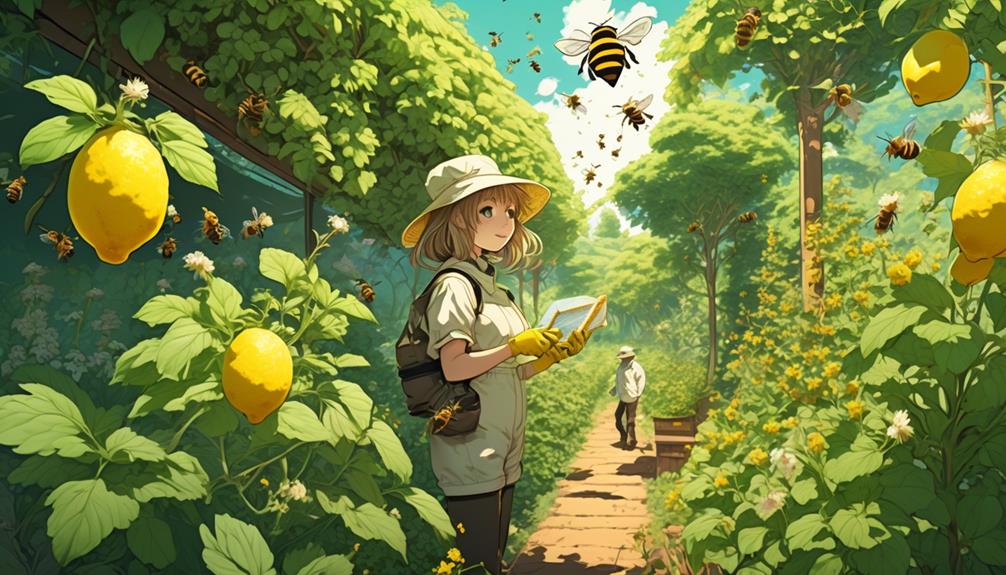
Recognizing the allure that lemon balm holds for bees can significantly influence your strategies in both gardening and beekeeping. If you're a gardener, you might consider planting more lemon balm as it not only attracts bees, which aid in pollination but also enhances your garden's biodiversity. For beekeepers, understanding the preference of bees for lemon balm can help in strategically placing your hives near these plants, encouraging higher honey production.
Let's illustrate the benefits of lemon balm to bees, gardening, and beekeeping in the following table:
Gardening | Beekeeping | |
|---|---|---|
Benefit 1 | Enhances biodiversity | Increases honey production |
Benefit 2 | Attracts bees for pollination | Promotes bee health |
Benefit 3 | Adds aesthetic appeal to your garden | Encourages bees to stay near the hive |
Frequently Asked Questions
What Other Plants, Aside From Lemon Balm, Are Known to Attract Bees?"
You're curious about what plants, other than lemon balm, attract bees. Well, bees are particularly fond of plants like lavender, sunflowers, and mint. They're also drawn to wildflowers such as poppies and daisies.
Moreover, fruit trees, like apple and cherry, are a big hit. Vegetable gardens, especially those with squash and cucumbers, also lure them in.
Are There Specific Types of Bees That Are More Attracted to Lemon Balm Than Others?"
Yes, specific types of bees are more attracted to lemon balm than others. Honeybees and bumblebees, in particular, seem to prefer it. They're drawn to its strong, minty scent and abundant nectar.
However, it's not just these bees; other pollinators such as butterflies also find lemon balm appealing.
Can the Presence of Lemon Balm in a Garden Affect the Honey Produced by Bees?"
Absolutely, the presence of lemon balm in your garden can influence the honey produced by bees.
Bees carry nectar from flowers back to their hive, where it's made into honey.
If they're collecting from lemon balm, the honey they produce can have a slight minty, lemony flavor.
It's a subtle difference, but if you're a honey connoisseur, you might just notice it.
Does Lemon Balm Have Any Potential Negative Effects on Bees?"
You're right to consider the effects of lemon balm on bees. Generally, it's a beneficial plant for them, drawing them in with its nectar. However, there's no definitive research showing it has negative impacts on bees.
It's always important to monitor your local bee population's health, especially when introducing new plants. Remember though, variety in a garden can promote a balanced ecosystem, so don't be afraid to experiment.
Are There Any Other Insects That Are Attracted to Lemon Balm Like Bees Are?"
Yes, there are other insects attracted to lemon balm just like bees. Butterflies, for instance, are drawn to its fragrant, nectar-rich flowers. You'll also find that beneficial insects such as ladybugs and hoverflies enjoy this herb.
However, it's worth noting that lemon balm can also attract some pests like aphids. So, while it's great for attracting pollinators, you'll need to keep a close eye on it to prevent unwanted infestations.
Conclusion
So, you've discovered that bees indeed love lemon balm.
This humble herb not only attracts bees, but also has a positive impact on your garden and beekeeping efforts.
By planting lemon balm, you're not just enhancing your garden's aroma and beauty, but also playing a crucial role in supporting our buzzing friends.
So, why wait? Plant some lemon balm today and watch your garden come alive with the delightful hum of busy bees.

